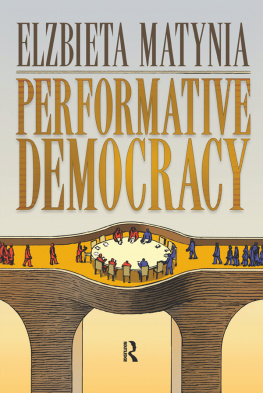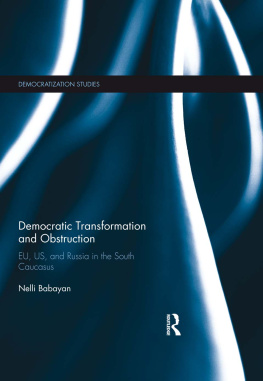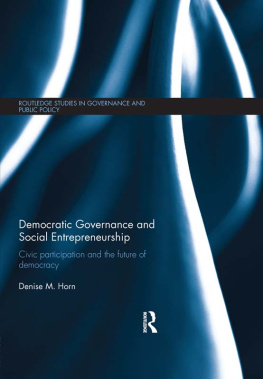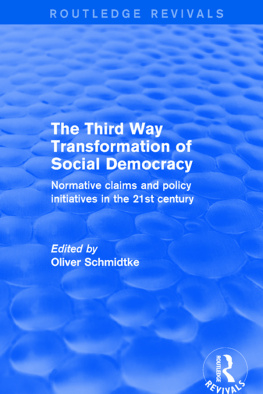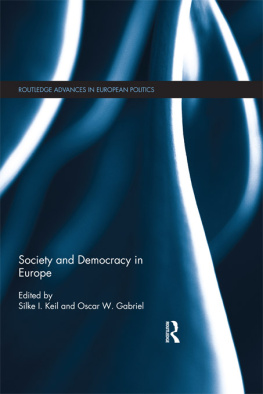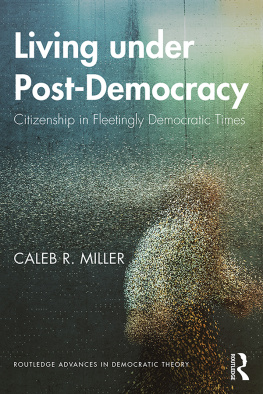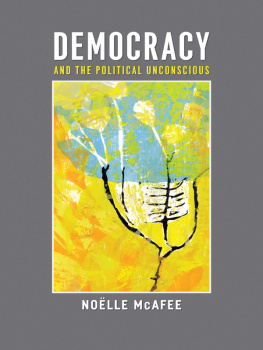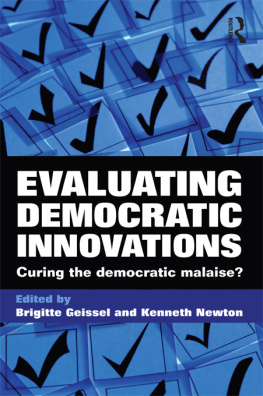PERFORMATIVE DEMOCRACY
THE YALE CULTURAL SOCIOLOGY SERIES
Jeffrey C. Alexander and Ron Eyerman, Series Editors
PUBLISHED
Triumph and Trauma, by Bernhard Giesen (2004)
Myth, Meaning, and Performance: Toward a New Cultural Sociology of the Arts, edited by Ron Eyerman and Lisa McCormick (2006)
American Society: A Theory of Societal Community, by Talcott Parsons, edited and introduced by Giuseppe Sciortino (2007)
The Easternization of the West, by Colin Campbell (2007)
Culture, Society, and Democracy: The Interpretive Approach, edited by Isaac Reed and Jeffrey C. Alexander (2007)
Changing Men, Transforming Culture: Inside the Mens Movement, by Eric Magnuson (2007)
Do We Need Religion? On the Experience of Self-Transcendence, by Hans Joas (2007)
A Contemporary Introduction to Sociology: Culture and Society in Transition, by Jeffrey C. Alexander and Kenneth Thompson (2008)
Staging Solidarity: Truth and Reconciliation in a New South Africa, by Tanya Goodman (2008)
Inside Jihadism: Understanding Jihadi Movements Worldwide, by Farhad Khosrokhavar (2008)
Meaning and Method: The Cultural Approach to Sociology, edited by Isaac Reed and Jeffrey C. Alexander (2009)
Performative Democracy, by Elzbieta Matynia (2009)
FORTHCOMING
Injustice at Work, by Franois Dubet
First published 2009 by Paradigm Publishers
Published 2016 by Routledge
2 Park Square, Milton Park, Abingdon, Oxon OX14 4RN
711 Third Avenue, New York, NY 10017, USA
Routledge is an imprint of the Taylor & Francis Group, an informa business
Copyright 2009, Taylor & Francis.
All rights reserved. No part of this book may be reprinted or reproduced or utilised in any form or by any electronic, mechanical, or other means, now known or hereafter invented, including photocopying and recording, or in any information storage or retrieval system, without permission in writing from the publishers.
Notice:
Product or corporate names may be trademarks or registered trademarks, and are used only for identification and explanation without intent to infringe.
Library of Congress Cataloging-in-Publication Data
Matynia, Elzbieta.
Performative democracy / Elzbieta Matynia.
p. cm. (The Yale cultural sociology series)
Includes bibliographical references and index.
ISBN 978-1-59451-655-9 (hardcover : alk. paper)
ISBN 978-1-59451-656-6 (pbk : alk. paper)
1. Democratization. 2. DemocratizationPoland. 3. Democracy. 4. DemocracyPoland. 5. Social change. 6. Social changePoland. 7. Intercultural communication. I. Title.
JC489.M38 2009
306.2dc22
2008031675
Designed and Typeset by Straight Creek Bookmakers.
ISBN 13: 978-1-59451-656-6 (pbk)
ISBN 13: 978-1-59451-655-9 (hbk)
I am a very fortunate person, as there are many generous and affectionate people in my lifenot just parents and friends, but teachers, mentors, and colleagues both here and abroad, including Polandand, of course, my own American/Polish family. They have all helped me to grow, and to understandand more importantly, to engage inthe world around me, both when that world was changing and later, when I changed the place from which I was trying to understand the world. I am also very lucky to have experienced moments in my life worthy of several kitschy novels that could easily outsell any of my academic prose.
It took a long time for me to make up my mind to start writing this book. It took developments in both my old country and my new one in the first decade of the new century to get me to sit down and write. When I think about it now, I realize that the entire project is the result of a truly bicontinental nurturing, as I owe it to certain people who, though divided by space, provided me at various times with a strongly supportive virtual community: they were and are my touchstones.
They are Jerzy Szacki, my first mentor at Warsaw University, and Ira Katznelson, my first dean at the New School for Social Research, both of whom I asked to look at early bits of the manuscript and who gave me invaluable criticism and suggestions. There is Shlomo Avineri in Jerusalem and Monroe Price at the Cardozo School of Law next door to the New Schooltwo individuals who helped me to think about the possibility of building bridges between the political imagination that had emerged in Central and Eastern Europe and developments beyond the region. There are the many women professors and colleagues dedicated to the cause of academic and political freedom, from Aldona Jawlowska, who inspired me in the 1980s, to Arien Mack, editor in chief of Social Research, who believed in me when I met her a decade later, and from whom I have learned so much. There was the brilliant Polish cultural critic Konstanty Puzyna, who would have loved the idea of democratic performativity, and Jonathan Fanton, then president of the New School for Social Research, whose commitment to the idea of human rights in the region I come from brought new life to the agenda of our university and turned the idea of the university as a civil society into reality.
And, of course, there are friends, whether academics or those who call themselves practitioners of ideas, who combine both vocations, like my first American friends, Jeffrey Goldfarb and his family, who helped me become a dedicated New Yorker and an American academicJeff having instigated my first fellowship at the New School, a trusted colleague with whom I can always share my projects and aspirations. Like Jonathan Schell, whose own writing and the attention he paid to my manuscript gave me courage when I needed it. And Judith Friedlander, whose continuous encouragement and the offer of a secluded office space helped me to sit down and write the main body of the text.
There are my South African friends and colleagues from whom I learned to transcend my parochialwhether American or Polishattachments: above all, the feminist scholar Shireen Hassim and economist Stephen Gelb. At the New School, Richard Bernstein and Agnes Heller, two philosophers who have kept the New Schools legacy of Hannah Arendt very much alive, have afforded fertile ground for people like me. And those New School colleagues without whom it would not be possible to imagine, much less implement, the summer institutes we conduct in Krakow and Cape Town, where we learn about local performative strategies, and how it is to walk in other peoples shoes: Ari Zolberg, Vera Zolberg, Ann Snitow, Jan Gross, Jonathan Veitch, David Plotke, Will Millberg, Jim Miller, Jose Casanova, Andrew Arato, and, of course, Jeff Goldfarb.
My friends and colleagues from the so-called region helped me to understand the early processes of democratic transformation taking place there: Martin and Zora Butora, Jan Urban, Alena Miltova, Ivan Vejvoda, Sonja Licht, Renata Salecl, Martin Palous, Janos Kis, Miklos Haraszti, Gyorgii Csepeli, Vladimir Tismaneanu, Andrei Marga, Anatolii Tikholaz, Yaroslav Hrytsak, Alex Grigorievs, Rumiana Kolarova, Dobrin Kanev, Dimitrina Petrova, Claus Offe, Ulrich Preuss, Gesine Schwan, Sigrid Meuschel, Adam Michnik, Marcin Krol, Edmund Mokrzycki, Jerzy Axer, Pawel Spiewak, Ewa Letowska, Jerzy Warman, Jacek Purchla, Tomasz Kitlinski, Pawel Leszkowicz, Agnieszka Graff, Jan Jozef Szczepanski, Jacek Wozniakowski, and the late Galina Starovoitova.

